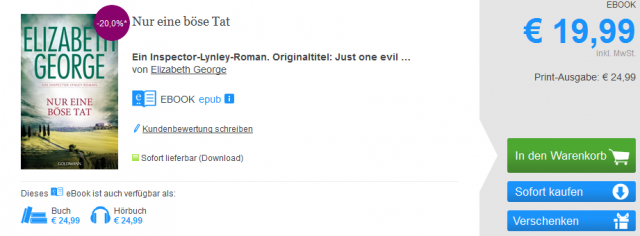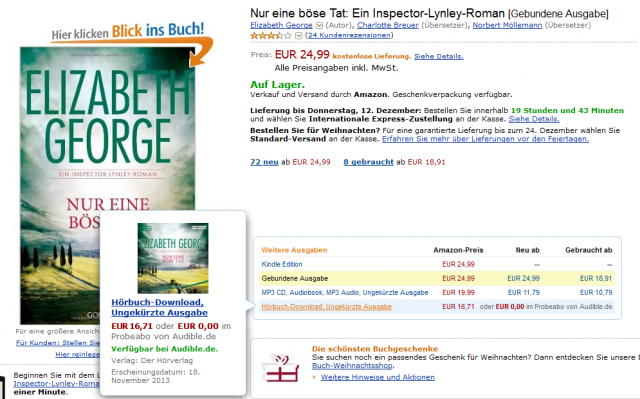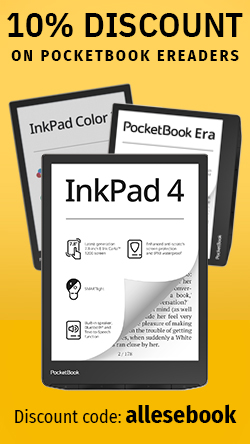Why Are eBooks Overpriced Compared to Audiobooks and Hardcovers?
In the past few weeks, we have frequently reported on various promotional offers for eBook readers. The devices are popular Christmas gifts and therefore enjoy great demand at this time of year – so it’s no wonder that almost all providers are bundling special deals to make the reading devices even more attractive.
When purchasing an eBook reader, the decision of where to buy eBooks in the future is increasingly made in advance, as almost all devices now come with an integrated shop. Due to fixed book prices, this hardly matters in terms of price for users, as eBooks cost the same everywhere anyway.
At least that’s how it should be – but there are some discrepancies that have caught my attention in recent weeks. I have therefore kept an eye on the pricing for some time.
Pricing without a reasonable basis?
Some surprises have emerged. Let’s take a look at the whole thing with some concrete examples.
The novel “Just One Evil Act” by Elizabeth George was released this November. Initially only as a hardcover for 24.99 euros, which isn’t unusual. However, the digital pricing is questionable, as the eBook costs the same as the hardcover edition: 24.99 euros. Sure, there are costs for creating the eBook too, but selling the digital product without any discount at the hardcover price is a bit cheeky. You can’t be surprised if the eBook gets pirated. And no, this is not a justification for piracy, but a statement of facts that the responsible parties should really take to heart.

Wait, what’s this? Different eBook prices for the same title; eBook.de: 19.99 euros, Others: 24.99 euros
Even more unusual, however, is that the digital book costs only 19.99 euros at eBook.de – 20 percent less than at Amazon. This shouldn’t be, as the eBook price must be the same everywhere. Initially, I assumed that Amazon hadn’t updated the new price yet, but in fact, this price difference has existed since the end of November. So that can’t be the reason.
From a customer’s perspective, the price of the audiobook is equally baffling. The unabridged version costs only 16.71 euros at Amazon or Audible, making it at least 3 euros cheaper than the eBook. It is unlikely that the processes to create an audiobook are less labor-intensive and cheaper (even with the cheapest narrator) than converting an existing book into eBook format. You have to wonder what this strange pricing is all about.

Many hours of creating an audiobook apparently are worth less than creating an eBook
It’s worth noting that audiobooks are not subject to fixed book prices, but “Just One Evil Act” is not an isolated case. A number of other eBooks are also far too expensive compared to audiobooks. For example, the crime debut by Harry Potter author J.K. Rowling, “The Cuckoo’s Calling,” costs 18.99 euros as an eBook, while the unabridged audiobook download at Audible is only 15.78 euros (eBook.de: 15.30 euros).
In the fantasy genre, these prices are also prevalent: “Dragon Elves” by Bernhard Hennen is available as an eBook for 13.99 euros, but the audiobook is 99 cents cheaper. The list could go on, but I think the point is clear: Why does an eBook, which can be created relatively quickly, cost more than an audiobook with many (often presumably over a hundred) hours of work? The comparison with the hardcover is equally valid. Why do you have to pay the same for a licensed, DRM-protected file as for a high-quality bound book that you can sell, lend, or give away?
The common denominator for titles with questionable pricing is Random House. The books are published by Goldmann, Blanvalet, and Heyne, all part of the Random House publishing group. But it can be quite different, as demonstrated by Bastei Lübbe, for example. “Inferno” by Dan Brown was released in May 2013, and the eBook costs 7 euros less than the hardcover book version. At a price of 19.99 euros, that’s still a bit too much for my taste for an eBook, but at least a 23 percent discount from the printed book (26 euros). Additionally, there was an online campaign at the book’s launch, where the title “The Da Vinci Code” was available as a free eBook.
It should become clear that an audiobook cannot be produced with a few clicks by listening to an enthusiastic head of the department at Random House (USA) talk about their work:
Why are eBooks so expensive?
We have already asked ourselves several times: Why do we have to pay so much for eBooks? As a private customer, I certainly find it hard to understand the prices (or differences) mentioned. Why should I pay the same for a usage license as for a hardcover book, with which I can also do what I want (lend, sell, …).
It is often argued that eBook taxation is responsible for the small (or non-existent) price differences, but that can’t be justified here, because audiobooks are also taxed at the normal rate of 19 percent (Austria: 20 percent).
The effort to create an eBook can’t be the reason either, because many hours of work go into an audiobook of a comprehensive book. Even with the cheapest narrator, the costs here are certainly significantly higher than for eBook conversion.
Fear of the unknown
The real reason for the sometimes completely exaggerated eBook prices can be found elsewhere and summed up in one word: Fear.
The real problem is not the manufacturing costs, the new type of distribution, or the higher VAT rate. These are just minor inconveniences that could be easily tolerated if desired. The obstacle to reasonable eBook prices is actually the publishers’ fear of a price drop in books.
If eBook prices were to fall in line with the actual cost savings, this lower price level would eventually become entrenched in customers’ minds, which would also harm the traditional book market. This is how many publishers seem to think.
But you can’t really blame them, because publishing is an old, well-functioning business, and the digital market is a relatively new phenomenon. They obviously have to be careful not to ruin their own business.
However, the fear is probably unfounded, as a look at the USA shows. There, eBooks already account for about 30 percent of the overall book market, and the rapid growth of recent years has noticeably lost momentum. And although average eBook prices have dropped significantly, there is still more revenue now than in 2008, before the start of the eBook boom, and despite the economic crisis.
Final words …
The pricing of eBooks is currently – especially in Germany – still undergoing a transition. The sometimes quite peculiar price differences between eBooks and audiobooks make this very clear. The fact that eBook prices are higher at the debut of a bestseller title is not the issue – that has always been the case. It’s more the combination of several factors that makes the whole thing incomprehensible from a customer’s point of view.
With an eBook, you’re only buying a usage license, meaning you don’t have free disposal over the purchase. With DRM, usage is further restricted. Additionally, the eBook lacks the physical touch, being available only in digital format, without any printing or traditional logistics costs. And then audiobooks are cheaper. As a potential buyer, it’s hard to swallow.
At the latest with the release of a paperback, eBook prices at least drop to a more acceptable level. In my view, in the coming years, it’s important to develop a reasonable and, most importantly, understandable pricing model for eBooks. The previous pricing model of the traditional book market will not work in the long run.
At least, average eBook prices are falling here as well. In 2011, the average eBook price in Germany was 9.56 euros, and in 2012, the average price fell to 8.61 euros. In a month or two, we will probably hear about further fallen eBook prices. However, indie authors might be responsible for the lowered average price, as their eBooks often cost only 1-4 euros.
Below is a short excerpt showing the effort it takes to record an audiobook:
[youtube]http://www.youtube.com/watch?v=xEXpJTrGsFk
In a GfK survey, the optimal eBook price was determined to be 40 percent below the print price. What do you think? How much should an eBook cost? Is it worth more than an audiobook?
